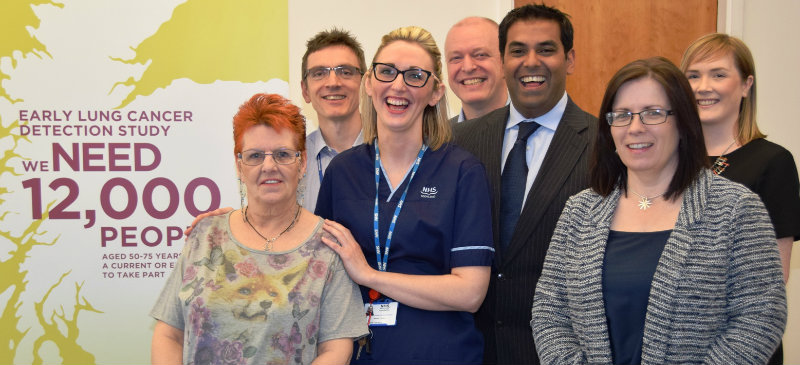The Evening Times ran an article about figures in a new report showing that women from Lanarkshire experience higher-than-average rates of stillbirth and neonatal deaths than other parts of Scotland. The region recorded the second-highest rate in Scotland with 6.42 deaths per 1,000 births. However it is worth noting that the figure of 7,096 Lanarkshire resident […]
Smokers help study into pioneering lung cancer test

NHS Lanarkshire has joined with colleagues in Glasgow to play a key role in a study into a new test for early signs of lung cancer.
Along with NHS Greater Glasgow & Clyde and NHS Tayside, NHS Lanarkshire is recruiting smokers and ex-smokers for the potentially life-saving research, spearheaded by the University of Dundee, University of Glasgow and University of Nottingham.
The research will help to decide if the test could be used for a lung cancer screening programme in Scotland and beyond.
Lung cancer is more common in Lanarkshire, Glasgow and Tayside than in many other areas of the country.
The ECLS (Early Cancer Detection Test – Lung Cancer Scotland) study is designed to find out whether the use of a pioneering new blood test – EarlyCDT-Lung – leads to earlier detection of lung cancer.
ECLS began recruiting in Lanarkshire in January, looking for people aged 50-75, who have smoked the equivalent of a pack of 20 cigarettes a day for 20 years.
NHS Lanarkshire’s research & development team, which finds people to take part in medical studies, has been impressed by the response from patients and needs to find only 150 more people to reach its target of 1000 local participants.
They will join 11,000 people who are currently being recruited by the Glasgow and Tayside teams.
People from the NHS Lanarkshire area can find out about participating in ECLS by visiting the website, eclsstudy.org, or by calling 01236 713432. Recruitment ends in mid-June.
Those from NHS Greater Glasgow & Clyde area can visit the site or call 0141 232 7630.
Half of the patients who take part will be offered the EarlyCDT-Lung test and the other half will have blood taken for use in other cancer studies, if they agree to that.
Dr Manish Patel, consultant respiratory physician at Wishaw General Hospital, who is leading the study in NHS Lanarkshire, said: “Potential participants are being approached through their GP. If they choose to take part, a blood sample is taken from them at a local GP practice or hospital.
“The tests then go all the way to the United States to be analysed. We look for the presence of certain proteins that the body produces in response to tumours.
“If the test is ‘positive’, patients receive a chest X-ray and a CT-scan of their lungs to find out if there is any cause for concern and a need for treatment.
“However, it’s important to note that most people who have a positive test will not have lung cancer and won’t go on to develop the disease.
“Only one in nine people with a positive test are likely to develop lung cancer within the next two years. Those with a positive test but no cancer detected will be offered lung scans every six months over the next two years.”
NHS Lanarkshire corporate research & development manager Raymond Hamill said: “We’re delighted to have the opportunity to work with our colleagues in Glasgow and Dundee on this important study.
“The very enthusiastic response we’ve had from local patients and the support we’ve received from local GPs shows Lanarkshire is a fruitful source of participants for research of this nature.
“We hope this study will provide the evidence we need to introduce a robust new method for earlier detection of lung cancer across Scotland and in other countries.”
Frances Mair, professor of primary care research at the University of Glasgow, said: “We aim to complete recruitment of our 12000 patients soon with full results available after two years of follow-up. It has been a major effort to recruit such an impressive number of study participants and we thank the public and GPs for their support.”
The research is co-funded by the Scottish Government and Oncimmune, the company which developed the EarlyCDT-Lung test. The researchers are from the Universities of Dundee, Glasgow, Strathclyde and Nottingham, the Tayside Clinical Trials Unit, NHS Greater Glasgow & Clyde, NHS Lanarkshire and NHS Tayside.
Among the first to be tested in Lanarkshire was 70-year-old Irene Fox, from Coatbridge, who had smoked 20 cigarettes a day for around 45 years before she quit five years ago.
Former lollipop lady Irene said: “I got a letter from my GP asking me if I’d be interested in taking part in the study.
“I have a condition called chronic obstructive pulmonary disease, which means the airways of my lungs are inflamed and narrowed and I have breathing difficulties. I also lost my father and a close friend to lung cancer.
“So I decided taking part would be very worthwhile.
“After the blood test I received news that my result was positive. The medical staff had told me the majority of people who tested positive would not have lung cancer so that meant I didn’t worry too much.
“Soon after I had a chest X-ray and a CT scan. Within a few days I had the good news that both were clear of lung cancer.
“I will get a scan every six months for the next two years through the study.
“The NHS Lanarkshire staff have been great at guiding me through the process and I’m sure the research will be of benefit to others as well as myself.”


Comments are closed.